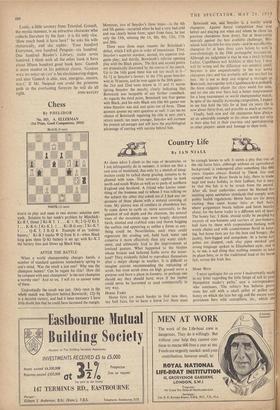Chess
By PHILIDOR No. 103. A. ELLERMAN (1st Prize, Good Companions, 1919) BLACK (8 men)
WHITE (13 men)
WHITE to play and mate in two moves: solution next week. Solution to last week's problem by Meschick: Kt-B 5, threat 2 Kt-K 3. I K x R; 2 Q-Q Kt 3. 1 . K-K 6; 2 Kt-K 3. 1 ... Kt (B 4) any; 2 Kt-K 7. 1 . . . Q-K 3; 2 R-Q 4. Example of an 'indirect battery.' Kt-B 5 masks W Q from K 6—when Black king goes there Q-Kt battery is set up; with Kt-K 3 the battery fires and blows up Black king.
AFTER THE BATTLE
When a world championship changes hands, a number of standard questions immediately spring to one's mind. Was the result a just one? Why was the champion beaten? Can he regain his title? How did he compare with past champions? Is the new champion a worthy one? And so on. I will try to answer some of these.
Undoubtedly the result was just. Only once in the whole match was Smyslov behind Botwinnik; 14-9i is a decisive victory, and had it been necessary I have little doubt but that he could have increased the margin. Moreover, two of Smyslov's three losses—in the 4th and 5th games—occurred when he had a very bad cold and was clearly below form; apart from these, he lost only the 13th, winning the 1st, 6th, 8th, 12th, 17th and 20th.
There were three main reasons for Botwinnik's defeat, which 1 will give in order of importance. First, Smyslov's superior stamina; second, his superior end- game play; and thirdly, Botwinnik's inferior opening play with the Black pieces. The first and second points are dramatically illustrated by the course of the match. Up to the 16th game there was not too much in it—' 81-7i in Smyslov's favour; in the 17th game Smyslov won in 70 moves, and he won again in the 20th game— the 21st and 22nd were drawn in 13 and II moves (giving Smyslov the match), clearly indicating that Botwinnik was incapable of any further comeback. As regards the third point, Botwinnik lost four games with Black, and his only Black win (the 4th game) was when Smyslov was sick and quite out of form. These answers answer my next question as well: I can see no chance of Botwinnik regaining his title in next year's return match: ten years younger, Smyslov will increase his present advantages and will have the psychological advantage of starting with success behind him.
Botwinnik was, and Smyslov is, a worthy world champion. Against fiercer competition than ever before and playing not when and whom he chose (as previous champions have done), but at three-yearly intervals against the best available challenger, Boi- winnik held the title for nine years—and he was effective champion for at least three years before he won it overwhelmingly in the 1948 pcntangular tournam Although my judgement is that he was a shade behind Lasker, Capablanca and Alekhine at their best, I nriy well be wrong and the difference was certainly small. Smyslov is also unquestionably in the true world champion class and has probably still not reached his best. He is not as deep and original a strategist as Botwinnik, but together with Capablanca he is probably the finest endgame player the chess world has seen, and no one can ever have. had a better temperament for a long tournament or world championship match. In spite of the steadily increasing competition, I expect to see him hold the title for at least six years (he is now about thirty-five), and possibly as much as twelve.
Finally, both new and old champions have always set an admirable example to the chess world not only in their play but in their courtesy and sportsmanship to other players: salute and homage to them both.






























 Previous page
Previous page